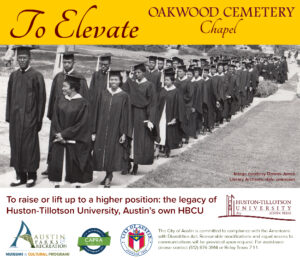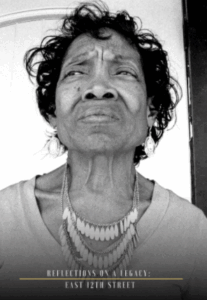External Resources


Operating hours
Monday – Friday
8:30AM – 5:30PM
Contact:
512.505.3070
 | Among the Oakwood Cemetery Chapel’s digital exhibits, the collection “To Elevate” contains many photographs from the University Archives. Here |
 |
The University Archives houses this documentary and can provide viewing access. Request access here. |
|
See photos of Huston-Tillotson University in its incarnations as Tillotson College, Samuel Huston College, Huston-Tillotson College, and the University of today, as well as an interview with Library Director and Archivist Danielle’ McGhee, in the “College Heights & African American Heritage” issue of this ongoing project, published in December 2020 |
|
Forklift Danceworks created and hosted “Take Me Out to Downs Field“, a year-long celebration of East Austin’s storied and well-loved East 12th Street baseball field. “Take Me Out to Downs Field” incorporated “tailgates, performances, poetry slams, and story circles that celebrate the legacy and future of this historic place“, as well as a radio show, a portrait series, and a virtual art exhibit. The University Archives contributed photographs and histories to “Take Me Out to Downs Field”, and contains recordings of the interviews and stories collected during this project. |
To continue your research beyond the University Archives, please consider the following organizations:

| From the Austin History Center: “The Austin History Center’s mission is to procure, preserve, present, and provide the historical records that make up Austin’s unique story. “As the local history division of the Austin Public Library, the Austin History Center provides the public with information about the history, current events, and activities of Austin and Travis County. We collect and preserve information about local governments, businesses, residents, institutions, and neighborhoods so that generations to come will have access to our history.“ The Austin History Center is located at 810 Guadalupe St. Austin, TX 78701. Please call 512.974.7480 or visit their website for visiting hours and policies. |
To continue your research beyond the University Archives, please consider the following organizations:
From the Texas State Historical Association:
“The Texas State Historical Association (TSHA) is dedicated to fostering “the appreciation, understanding, and teaching of the rich and unique history of Texas and, by example and through programs and activities, encouraging and promoting research, preservation, and publication of historical material affecting the state of Texas… “TSHA focuses on two major service areas: education programs and historical publications…the Association’s most widely used publication is the Handbook of Texas. TSHA also…publishes the Southwestern Historical Quarterly journal and numerous books on Texas history, such as the biennial Texas Almanac.” The Texas State Historical Association is located at 3001 Lake Austin Blvd., Austin, TX 78703. |